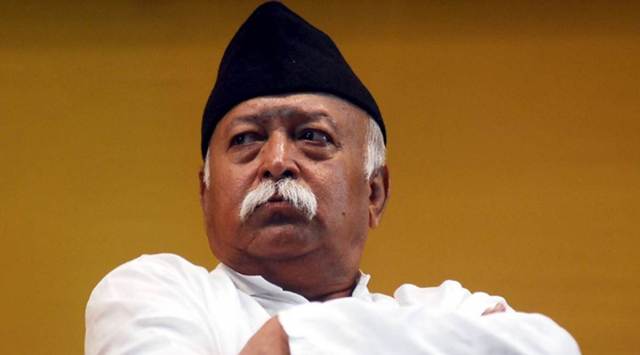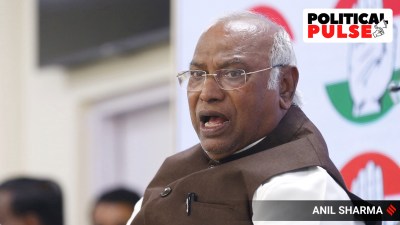- India
- International
India jolted China, must build ties to grow bigger than Beijing: RSS chief
Rashtriya Swayamsevak Sangh (RSS) chief Mohan Bhagwat attacks ‘tukde tukde gang’, foreign ‘agents’; backs new farm legislation.
 Mohan Bhagwat. (File Photo)
Mohan Bhagwat. (File Photo)India’s response to the “encroachments” in Ladakh had “numbed and jolted” China, Rashtriya Swayamsevak Sangh (RSS) chief Mohan Bhagwat said on Sunday, and called for a strengthening of ties with other neighbours to present a more powerful counter to the Chinese.
In his address to a small gathering of swayamsevaks at the RSS’s annual Vijayadashami event that was shrunk by restrictions due to the Covid-19 pandemic this year, Bhagwat threw his weight behind the central government on the three contentious farm laws and virtually endorsed Uttar Pradesh Chief Minister Yogi Adityanath’s theory of an “international conspiracy” against the state government — even though he did not directly mention either the new laws or the Hathras incident, both of which triggered powerful protests.
“China is mentioned in an uncertain (“asandigdha”) way in the discourse on the coronavirus pandemic. An arrogant and expansionist China encroached upon our territory. It is conducting itself similarly with the whole world. But Bharat’s reaction numbed, jolted them. Our soldiers gave them a brave reply, and we all stood together as patriots. Due to this, other countries too have started to scold China,” Bhagwat said.
“This has created a situation that China had not thought of. It is not clear how it will now react. So we will have to always remain alert and prepared,” he said.
Bhagwat added: “We will have to improve our strategic preparedness, economic power and international relations and grow bigger than China in power and reach (“vyapti”) in our relationship with neighbours…

“We must foster ties with neighbouring countries such as Brahmadesh (Myanmar), Sri Lanka, Bangladesh, and Nepal, which are countries much like us for thousands of years. We must connect ourselves quickly with them. Differences and disputes would always be there, but we will have to try and clear them soon.”
The incident in Ladakh “was the first time that China experienced the coming together of the patriotism and valour of Indian soldiers, the self-respecting policies of today’s leadership of Bharat, and the unity displayed by its people.” the RSS chief said. “We will have to keep augmenting this power.”
Opposition parties and the “tukde-tukde gang” were “trying to divide and weaken Indian society by creating social strife”, Bhagwat said. “There are such powers in the world and their agents (“hastak”) in India, who paint the diversity of India as divisions, and incite strife,” he said.
“If a one-off incident happens… it should not happen. Why should there be any incident of atrocity and discrimination? But if a one-off incident does take place in such a big country, the administration should immediately catch the culprits and punish them as soon as possible. But while reacting as a society, we must keep in mind that it does not affect national integration, and (reactions) must be expressed within the limits of the constitutional and legal framework.”
However, Bhagwat said, “there are people in our country who feign faith in the Constitution and law, but are seen indulging in violence. They are also seen raising slogans of splitting the country (“desh ke tukde karne ki ghoshnayein”). They try to break the society while trying to pose as its saviours.”
Bhagwat likened “these people” to “those described by Babasaheb Ambedkar in his delineation of the grammar of anarchy in his speeches while giving the country its Constitution”.
“We will have to guard against their design,” the RSS chief said.
Bhagwat also blamed “these people” for spreading misconceptions about the RSS idea of Hindutva.
“We use the word Hindu for all 130 crore people of India. We don’t use it in the limited sense of way to worship or dietary practices (“puja aur khaanpaan”). It is in the sense of the country’s identity in terms of the continuity of its spiritualism-based traditions with all its values. So all those who consider this nation and its timeless cultural values as their own, and respect its ancient tradition (“poorvaj parampara”) are Hindus.”
An attack on this concept “loosens the common string that binds us together”, Bhagwat said. “So those trying to divide us start by criticising the word ‘Hindu’. They try to spread that we are not Hindus. They describe the diversity of India in terms of separateness. They call differences, separateness. They make it a source for separatism.”
Apparently referring to non-Hindus, Bhagwat said, “If we call you as Hindus or you call yourselves as Hindus, you don’t lose anything except the fundamentalist (“kattarpanthi”) belief that yours is the only superior faith. You have to only quit the fundamentalism and feeling of separatism that you are different. We have to guard against people who want to divide the country, like the tukde-tukde gang. We must advise emotional integration as Indians.”
The RSS chief called for adoption of Swadeshi as a way to achieve prosperity and strength. “Swadeshi isn’t just about production within the country by our own hands and with the economic gains remaining within the country. The thought behind such production should be our own (swa-adharit).” The late Dattopant Thengdi, founder of the RSS’s labour outfit Bharatiya Mazdoor Sangh, had defined Swadeshi as “a situation of international cooperation based on equality”, Bhagwat said. “We are open to foreign investors and give relaxations to companies offering newer technologies, provided they engage on our terms and mutually agreeable conditions. But such a decision has to be based on mutual consensus.”
Bhagwat expressed satisfaction that as a result of the reforms in the farm sector, farmers would be able to sell their produce anywhere in the country.
He called for promoting ancient Indian agricultural practices and organic farming by blending them with modern agricultural practices. “While designing our agricultural policy we should empower our farmer to control his seed banks, create manure, fertilisers and pesticides on his own, or procure these from areas neighbouring his village. He should be educated about the art of storing and processing his produce, and have access to such facilities,” Bhagwat said.
“The policies should be such that a farmer should be able to use these research findings and sell his produce without getting trapped – either in the interpretations of those findings that are aimed at making profit, or in sponsored research by the corporate sector, or under pressure from market forces and middlemen. Only then will such a policy be compatible with the Bharatiya view, and be a truly Swadeshi agrarian policy.”
Bhagwat welcomed the new education policy of the Narendra Modi government. “A new education policy formed on the basis of extensive deliberations and dialogue has been declared and launched. But for these initiatives to be successfully implemented, the process will have to be watched and monitored keenly to the finish,” he said.
“Fortunately, we can rely on and expect from the prevailing political leadership to engender the feeling of oneness and trust with regard to matters small and big among all the people. An administrative system connecting society with government has to be more sensitive and transparent to facilitate and accomplish this task in a better fashion.”
On the Covid-19 pandemic, Bhagwat said, “We need not fear coronavirus, but should be alert and cautious. We cannot stop living. Coronavirus is spreading but fatalities are less. Due to the pandemic, we have started learning the importance of hygiene, cleanliness, environment, and family values all over again.”
The pandemic, Bhagwat said, “has given rise to challenges of unemployment. Many lost their jobs, and labourers are now returning to cities. But the jobs may not be there. The challenge is to create employment opportunities in different places and to give training to those who will replace those who have returned to their villages”.
Apr 19: Latest News
- 01
- 02
- 03
- 04
- 05






































